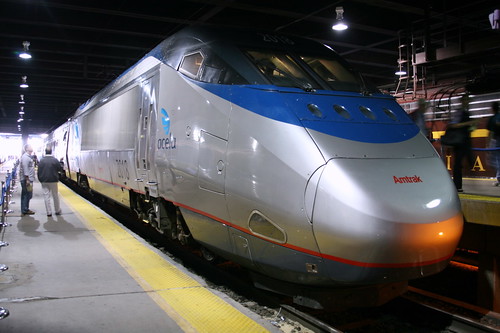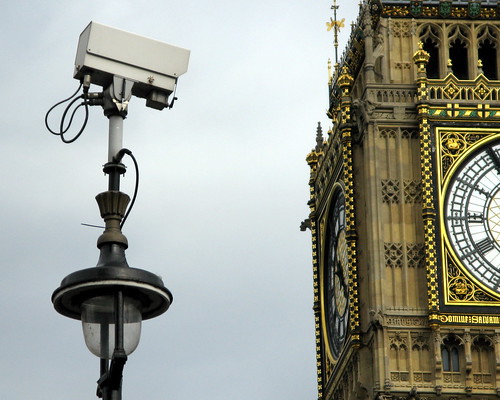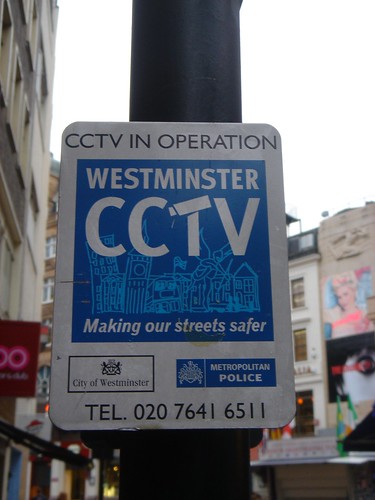Spiffy Ride – French Nuclear Power Cleans Up Eurostar High-speed Rail Network; 3-years ahead of schedule to beat CO2 reduction goals
(Source: Green Inc, NY Times)


(Source: Green Inc, NY Times)


You maybe have 25 or 35% of the space of any promotional material given over to a health warning. These warnings would be graded depending on the emissions from the vehicle, with the worst gas-guzzlers carrying the most severe warnings. It would have to counter the impression given by some manufacturers that their vehicles are greener.
We are in a four-stage process of addressing the challenge of climate change, as Britain was in a four-stage process meeting the challenge of Adolf Hitler: denial, appeasement, phoney war then total war. I believe we are staggering between appeasement and phoney war at the present time. Our effort is improving, but in dribs and drabs, suggesting that we’ve not entirely convinced ourselves that the threat is real. It is as if we have grasped that the scientific debate has been settled but the hard, practical choices still have to pass through a multitude of sceptical arguments.”
Source: Tree Hugger)
 Is Enthusiasm for High Speed Rail Just Another Speed Addiction?
Is Enthusiasm for High Speed Rail Just Another Speed Addiction?
The world is a confusing place – no sooner do the governments of the world finally start taking high speed rail seriously as an alternative to aviation, and the environmentalists start complaining. First we had Obama’s massive investment in high speed rail, which Jim Kunstler (who else?) described as “perfectly f***ing stupid.”And now UK politicians are limbering up to support a significant upgrade of the country’s rail system – but John Whitelegg over at The Guardian says High Speed Rail is an expensive and counterproductive red herring:
The HSR plan is a large and expensive sledgehammer to crack a modestly sized nut. We could stimulate the economy by building 1,000 miles of HSR, but the sums would not stack up in terms of how many jobs this would create per £100,000 spent.If we really want to create jobs in all local economies, rather than drain them away along a very fast railway line, we could insulate 20m homes; make every house a mini-power station to generate and export its own electricity; sort out extremely poor quality commuter railway lines around all our cities; improve inter-regional rail links; and build 10,000 kms of segregated bike paths to connect every school, hospital, employment site and public building to every residential area.
(Source: Wired)
(Source: Autobloggreen)
 According to Autocar in the UK, Scotland Yard has announced plans to replace half of its fleet of vehicles with either electric or air-powered vehicles within four years. We’re not sure what air-powered vehicles are being considered, but we’ve been hearing about the compressed air vehicle from MDI for the last few years at least.
According to Autocar in the UK, Scotland Yard has announced plans to replace half of its fleet of vehicles with either electric or air-powered vehicles within four years. We’re not sure what air-powered vehicles are being considered, but we’ve been hearing about the compressed air vehicle from MDI for the last few years at least.
There are already 140 or so Toyota Prius hybrid police cars currently in use by the Metropolitan Police Service and officers have been putting electric versions of the smart fortwo through their paces. Those two programs are expected to continue and grow. Nigel Jakubowski, head of transport services, says, “The uniformed officers who have driven them say they are very quick. We have installed charging points at the stations the cars are based in, and they work very well.”
(Source: Guardian, UK; Photo: thingermejig @ Flickr)
Britons must reduce their dependency on cars if the UK is to meet its climate targets, scientists warn today. In a new study they said that simply switching wholesale to cleaner or all-electric cars, as announced by the government in its low-carbon car strategy last week, would not be enough for the transport sector to cut its carbon emissions.
The report by the UK Energy Research Council (UKERC) said the government had to tackle driver behaviour as well as car technology to reduce transport emissions. That means incentivising overall changes in the way people travel by encouraging walking and cycling, for example, and also discouraging the use of cars through taxation or other levies.
Last week the government announced a £250m plan for incentives of up to £5,000 each to consumers to buy low-carbon or electric cars from 2011 to help decarbonise transport.
Speaking ahead of this week’s 2009 budget announcements, Jillian Anable, head of transport research at UKERC, said the electric car plans were welcome but not enough to tackle the transport emissions problem alone. “They’re being billed as policies to affect the low-carbon car market and that’s very one-dimensional. [The government needs] a set of policies around low-carbon transport transformation so the grants that we see need to be more widely […] targeted to low-carbon travel behaviour.”
She added: “Without managing travel patterns themselves, it is very difficult to meet the technological challenges, including how the electricity is generated, at the scale and pace required. Without effective policies to manage demand for travel, emission cuts through vehicle technology will be made much more difficult and may come too late.”
Road transport accounts for 22% of the UK’s total carbon emissions, with more than half of that coming from cars. In trying to work out how to cut these emissions, the UKERC report reviewed more than 500 international studies looking at different policies aimed at reducing carbon dioxide emissions from road transport. The scientists looked for methods and incentives that seemed to work best and where well-intentioned policies led to unintended consequences.
Friends of the Earth’s transport campaigner Tony Bosworth said the UKERC report was “further evidence that we need a green transport revolution. Low carbon cars, though important, are not enough to tackle transport’s contribution to climate change — we must also change how and how much we travel. The RAC revealed this week that people use their cars for over three quarters of journeys between two and three miles long — with proper facilities in place, there’s no reason why these journeys couldn’t easily be made by bus, bicycle or on foot.” He added: “The government must rapidly steer its transport policy in a greener direction and make alternatives to cars more attractive by improving public transport services and make walking and cycling far safer.”
A Department for Transport spokesperson said: “We agree that in order to tackle climate change we need to do more than support electric cars. That is why in addition to the £400m to encourage development and uptake of ultra-low emission vehicles, we also spend £2.5bn a year on buses, £140m on cycling and require local authorities to factor in the impact on the environment when developing their transport strategies. Tackling climate change is one of the single most important issues we face, and transport is central to how we deal with it.
(Source: Financial Times)
In one of the most striking signs yet of the conflicting pressures buffeting the automotive industry, some new cars are now selling more cheaply than used vehicles.
A shortage of good-quality used cars combined with aggressive discounts offered on many new ones by retailers and manufacturers now mean that some new cars can be had for as much as £1,000 less than used ones in good condition.
Parker’s, the car-buying price guide, on Wednesday said it had spotted a new Vauxhall Corsa available from one dealer for £5,995 – nearly £500 less than a used model with 5,160 miles on the clock selling for £6,494.
The guide also spotted a Mazda 6, available new for £11,485 from car supermarket Cheap-Cars-Online, being sold used with 2,500 miles on its clock for £1,000 more, at £12,499.
“For the first time, used cars are more expensive than new,” Parker’s said. It noted that the shift was not across the board, but said this was the first time it had seen used cars command a premium over new ones since the guide’s launch in 1972.
In recent months used car prices have been climbing in the UK and many other big markets, including the US, because of a shortage of available stock as new car sales plummet and recession-squeezed consumers shift to second-hand models.
Manufacturers including Vauxhall – owned by struggling General Motors – and Peugeot-Citroën are offering steep incentives on new cars to keep their inventories low as they contend with their slowest sales in decades.
The financial squeeze faced by many dealers and the rise of car supermarkets and brokers have also contributed to the downward pressure on new-car prices.
Click here to read the entire article.
(Source: The Sun, UK via News.com.au)
Daniel had got friendly with the other woman, pretty toff Clare Irby, after Sarah dozed off on a nine-hour flight to London from the Indian city of BANGALORE.
Magazine covergirl Sarah went mad and had to be calmed down by the crew at 30,000ft. Armed cops boarded Kingfisher Airlines Flight IT001 at Heathrow and arrested the trio.
A police source said Ms Hannon fell asleep after drinking with Mr Melia before and during the flight.
Mr Melia then “got on well” with Ms Irby underneath a blanket but was stopped by hostesses – at which point Sarah awoke and started screaming.
“They certainly put the bang into Bangalore,” the source said.
Mr Melia, 36, and Ms Irby, 29, were arrested for alleged gross indecency while Sarah was held for being drunk on an aircraft. All three were released on bail.
(Source: Guardian, UK)

The security operation at this week’s G20 summit was thrown into chaos last night when it emerged that the entire network of central London’s wireless CCTV cameras will have to be turned off because of a legal ruling.
The Department for Transport (DfT) has ruled that Westminster council’s mobile road cameras – a third of the authority’s CCTV network – “do not fully meet the resolution standards required” and must be switched off by midnight tomorrow.
The blackout begins on the eve of the summit, when world leaders arrive in the capital and protesters take to the streets.
The council only discovered last week that images from its newly installed £15m traffic cameras do not meet the quality required under the Traffic Management Act, which comes into force on 1 April.
In an urgently drafted letter seen by the Guardian and hand-delivered to the transport secretary, Geoff Hoon, on Friday, the council warns its entire network of wireless cameras will need to be shut down unless the minister finds a way to give special dispensation. “This would have a serious impact on our ability to manage our road network safely, as well as impeding our community protection efforts,” the letter states.
It adds: “We are seeking authorisation from DfT as a matter of urgency to enable Westminster to continue using its digital CCTV network.”
The 60 cameras in question use the latest digital technology and transmit images using Wi-Fi. While they are primarily for traffic enforcement, according to the council the cameras are “an essential additional tool” to tackle crime and disorder, and have been fixed to strategic locations across the capital ahead of the summit.
The 24-hour live footage from the cameras, which monitor roads around the West End, Belgravia, Trafalgar Square, Knightsbridge, Oxford Street and London’s main bridges, is also accessible to police and the intelligence services.
Click here to read more.